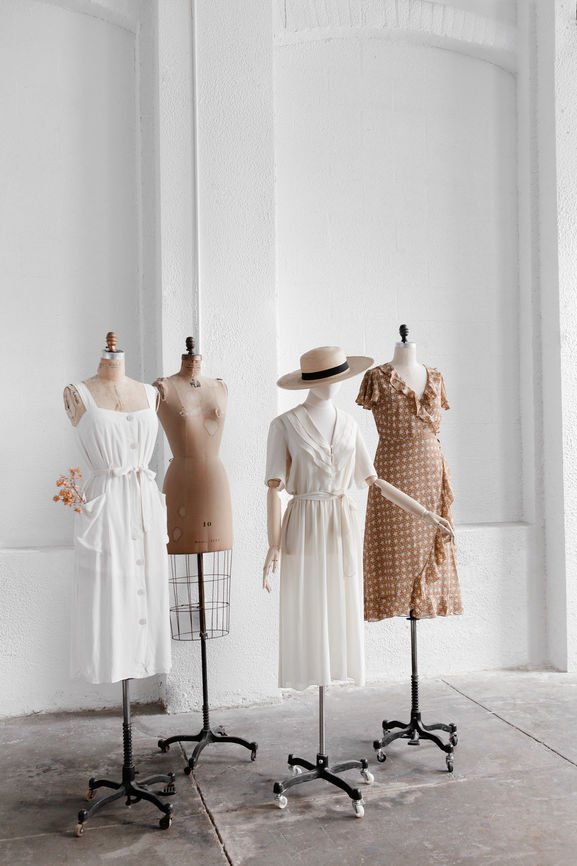
5 Things To Look For In A Sustainable Garment
Sustainable Shopping,
Simplified
It’s the classic dilemma for the sustainable shopper: you’re looking to do good with your wallet, but sometimes that new brand with the cute dresses you just discovered doesn’t give you any hints about their ethics or environmental standards.
Fear not. Below are a few of the top things to look for in a garment that is making an effort towards being better than your average fast fashion fare!
1. Made In The USA
If a company is manufacturing in the United States and complying with government law, their workers are making minimum wage in safe working conditions that are being consistently inspected. For Los Angeles County, the largest manufacturing area in the US, minimum wage is scheduled to increase annually until it reaches $15 by 2021. Producing in the US is becoming a popular choice again for small brands looking to scale slowly. Fast turnaround times, increased flexibility, and small production runs make local manufacturing more cost effective and appealing.
By comparison, the rising labor costs in China have led companies to diversify their supply chains into other high-risk countries, such as Bangladesh, India, Vietnam and Myanmar. Workers in Bangladesh currently earn the lowest minimum wage in the world, taking home about $43 a month. Chinese factory workers make slightly more: $117 to $147 a month. American garment workers, however, earn about $9 an hour, taking home $1,660 a month.
2. Natural Fibers
Garments made with natural fibers like cotton, hemp, linen, wool, and some semi-synthetic fibers, specifically Tencel and Modal are good sustainable choices. Natural fibers biodegrade, unlike fabrics derived from plastics such as polyester and nylon. The plastic microfibers these fabrics shed when washed account for a significant portion of plastic waste entering the ocean, and they won’t be going away anytime soon.
3. High Quality Construction
A well constructed garment is a more sustainable garment. They hold up better in the wash, give you a longer lifetime, and shed fewer fibers. Check the garment for loose threads, and flip it inside out to see the stitching. Are the stitches even, closely spaced, and lying flat on the fabric? If your seams are wavy or stitches appear looser than they should, these are warning signs that the garment was made hastily and won’t withstand much wear and tear.
4. Natural Dyes (think indigo)
Natural dyeing is not a very common practice in the fashion industry, but clothing dyed with natural materials like Indigo are better for you and the environment. By embracing green chemistry and eliminating toxic chemicals from the dye process, the wastewater that dye houses produce would be significantly less harmful when re-entering the environment. The conventional dye process treats fabric with toxic chemicals that have become the industry standard. These chemicals can permeate your skin, which is capable of absorbing 64% of the chemicals from the fabric you wear into your body.
Keep an eye out though for natural indigo instead of the synthetic kind, which can look almost identical.
5. A Fair Price For A Fair Profit
There’s a reason fast fashion’s low prices are unsustainable. The only way they are possible is because someone in the supply chain isn’t getting paid for their work, and those that are most vulnerable are the garment workers and farmers.
“If sustainability is to be the cornerstone of any company’s ethos, then the following three tenets are a great place to start: care about the people making their clothing, your impact on the planet, and give fair profit to all involved.”
Low cost means low regulation. Governments in today’s highest competing apparel markets are trying to provide the lowest manufacturing prices possible, all while putting worker safety at the bottom of their priorities. A recent example of this is the tragic occurrence of the Rana Plaza factory collapse in Bangladesh, in which more that 1,100 garment workers died. This shows the extent to which manufacturers are ignoring labor and safety laws in order to win large contracts with companies who want to churn out on-trend fashions at unrealistic prices.
If sustainability is to be the cornerstone of any company’s ethos, then the following three tenets are a great place to start: care about the people making their clothing, your impact on the planet, and give fair profit to all involved.
RELATED READING
About The Author
Ashley Denisov is the founder of 1×1, a sustainable clothing brand which selects, designs, and releases their favorite wardrobe staples one at a time. She is passionate about sourcing sustainable materials, and exploring cutting edge green technologies for the fashion industry. See her latest collection at 1×1.la.